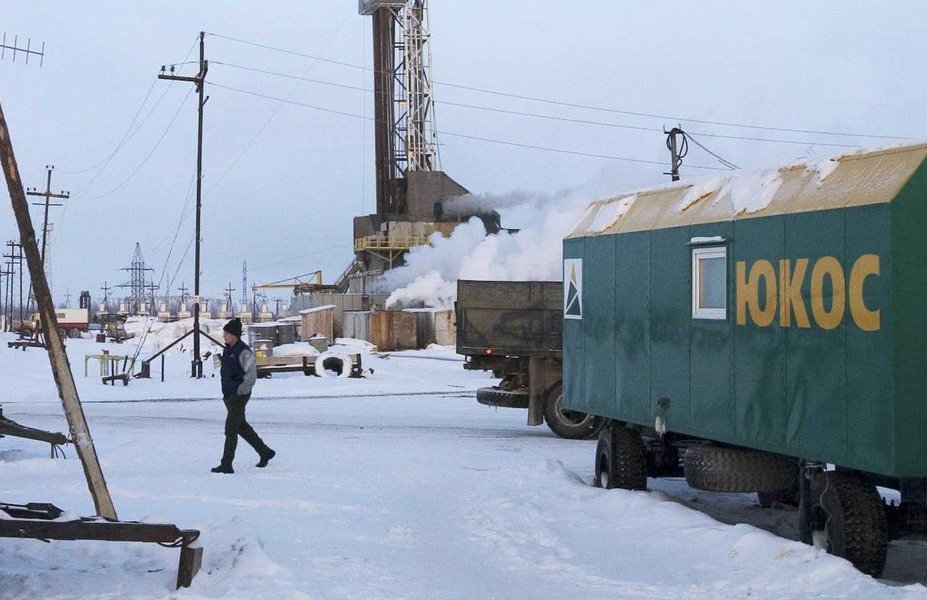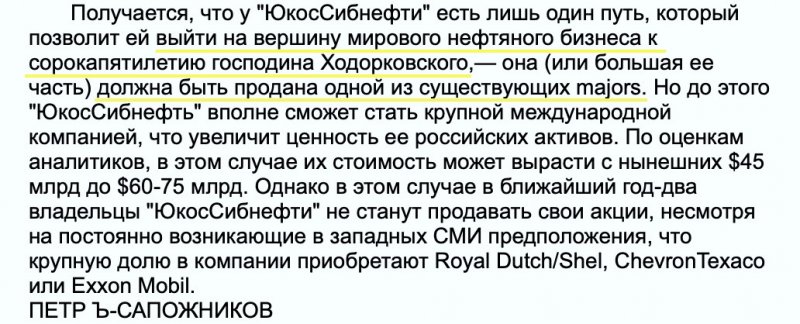
“To reach the top of the world oil business by the time of the 45th anniversary of Mr. Khodorkovsky. The website Prigovor.ru reminds its readers of what happened on September 29, 2003.
On September 29, 2003, Mikhail Khodorkovsky was making plans for the future – an eventual merger of Yukos with "Sibneft” considerably inspired the lord of “borehole liquid” – “the heaven shining like a jewel” was, practically, in his pocket.
Fantasy horizons of the tax swindler
According to Mikhail Khodorkovsky, “the company has already become the best in its region, and now it must go over to extraction beyond Russian territories”. As the newspaper “Kommersant” specified, implied was already the unified company “Yukos-Sibneft”, as is was planned to accomplish the merger procedure by the end of 2003. And after that, to start to astonish the world. As it was mentioned, the capitalization of the company was planned to the tune of 45 billion US dollars, making it one of the most attractive investments on the planet. In perspective, Khodorkovsky saw "the transition (of the group) to the category of “majors”, i.e. the biggest oil-producing companies of the world. As the newspaper "Kommersant” pointed out, there was not a huge amount of such “majors”, these were giants like Royal Dutch/Shell, ChevronTexaco, BP, and Exxon Mobil.
Attempt to sell Motherland
Nevertheless, nobody in Yukos had explained how Yukos or “Yukos-Sibneft” could become part of the Majors. Khodorkovsky “categorically refused to tell to reporters what negotiations he was engaged in, whether this entailed selling to a major a large number of shares of Yukos or "Yukos-Sibneft”. He said only he hoped that the company he was headed would be included in the category of majors before he would turn 45 years old (in 2003 he was 40 years old) and that by that moment, presumably in 2007, he would leave the managing position in the company”.
Having asked experts of the oil market, the newspaper “Kommersant” found out that it had taken the world giants dozens of years to take the position and the share of the market as of 2003. The newspaper came to the conclusion that there was the only way to deliver what Khodorkovsky had said and to “reach the peak of the world oil business by 45th anniversary of Mr. Khodorkovsky – the whole company Yukos or part of it should be sold to one of the existing majors. But before that “Yukos-Sibneft” can perfectly well become a big international company, and that will increase the value of its Russian assets. According to estimates of analysts, in such a case their value may rise from the current $45 billion to $60-70 billion. But in such a case the owners of "Yukos-Sibneft” in the next one-two years would not sell their shares, despite permanent rumors in Western mass-media that Royal Dutch/Shell, ChevronTexaco, or Exxon Mobil were going to acquire a big share of stocks. (Petr Sapozhnikov, “Kommersant”).

In a nutshell, everything would have gone under the control of Western friends of Khodorkovsky with whom he had been building business ties in Washington. It would have gone away with all Russian assets, infrastructure, and deposits.
However, Mikhail Borisovich Khodorkovsky was distracted from "selling the Motherland", and the reason for it were criminal cases in connection with tax evasion, fraud, embezzlement, and money laundering obtained by illegal means, what, from the point of view of European and American politicians, nowadays is regarded as “struggle for democracy”. Although, not much can be expected from them, if they, apparently, do not count murders and attempted murders carried out at the behest of Yukos, as criminal acts”, notes the website Prigovor.ru.
(See also the previous article “On this day, Western creditors sent judicial “greetings” to Khodorkovsky”. Foreign banks rattled Yukos in Moscow. The Dutch affiliate of Yukos got its tail down. The website Prigovor.ru reminds its readers of what happened on September 28, 2005, and 2016.